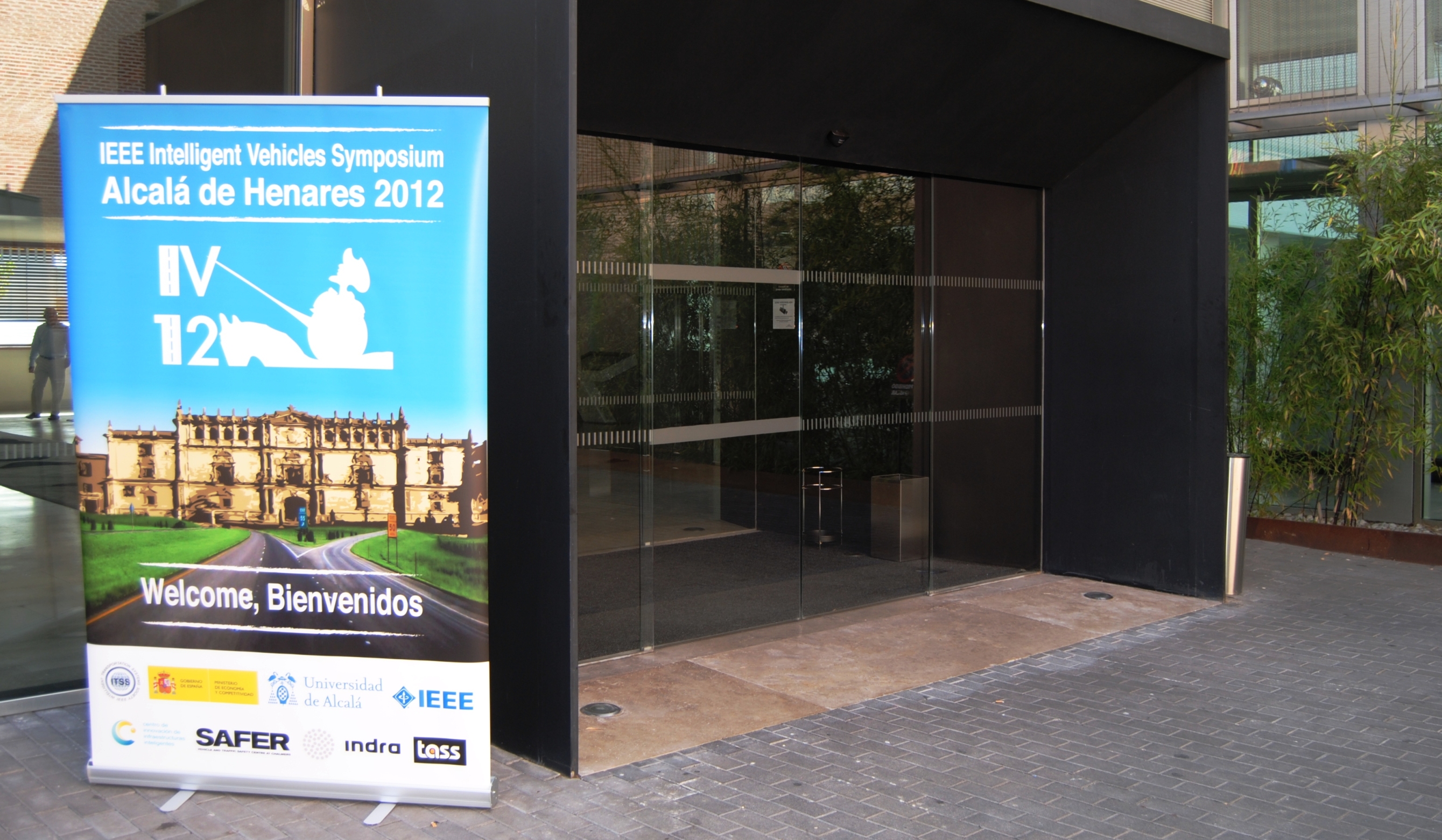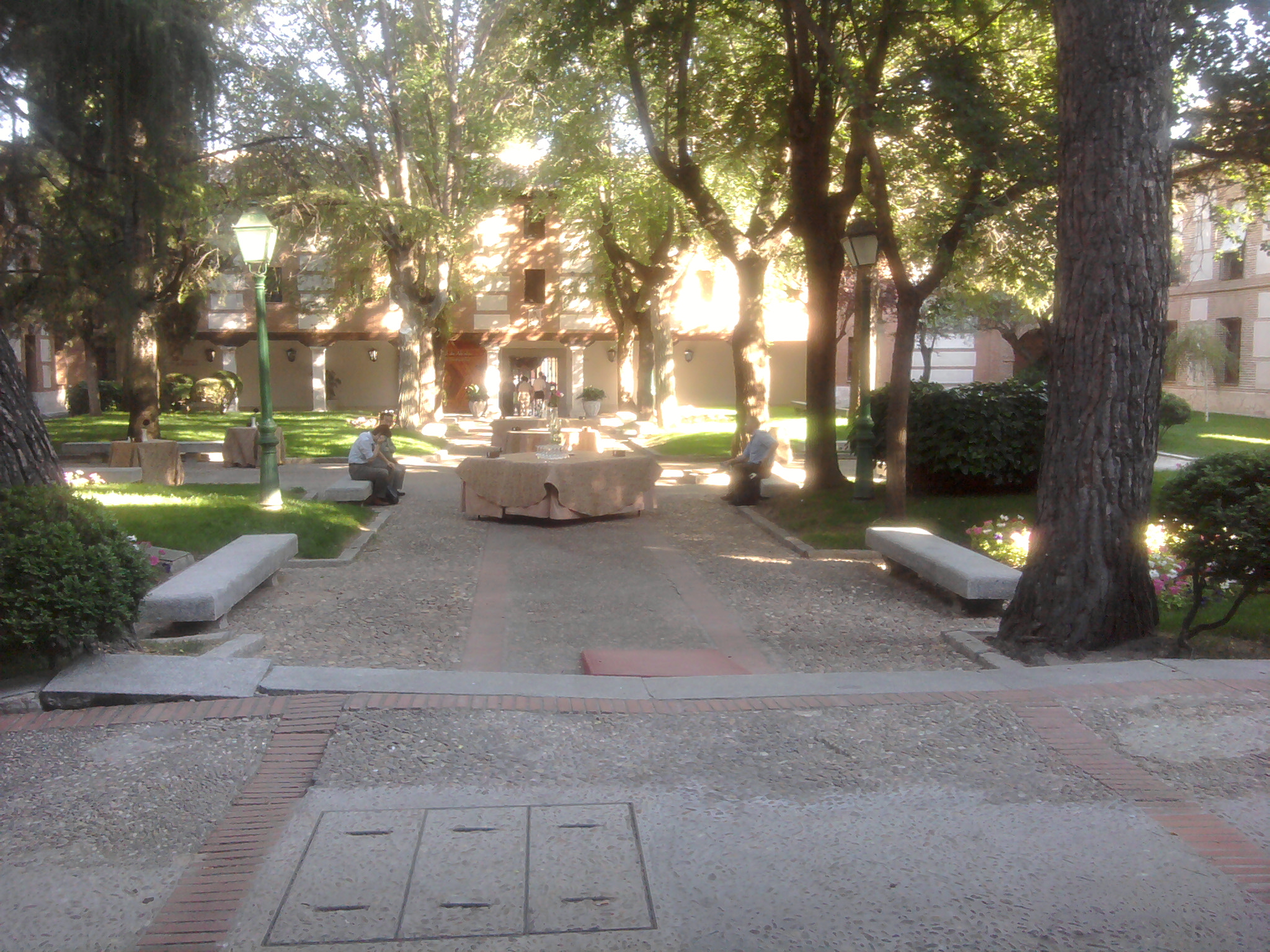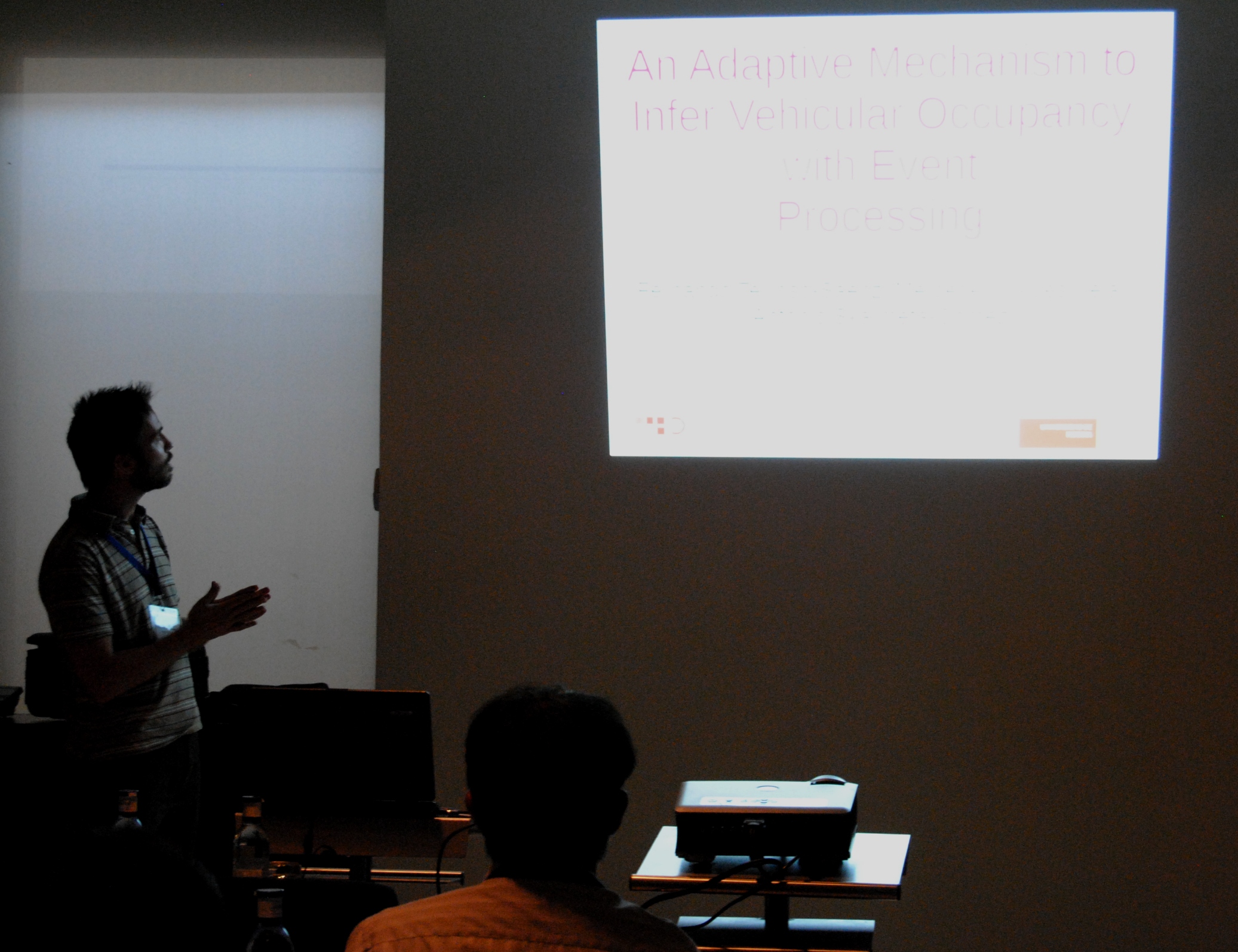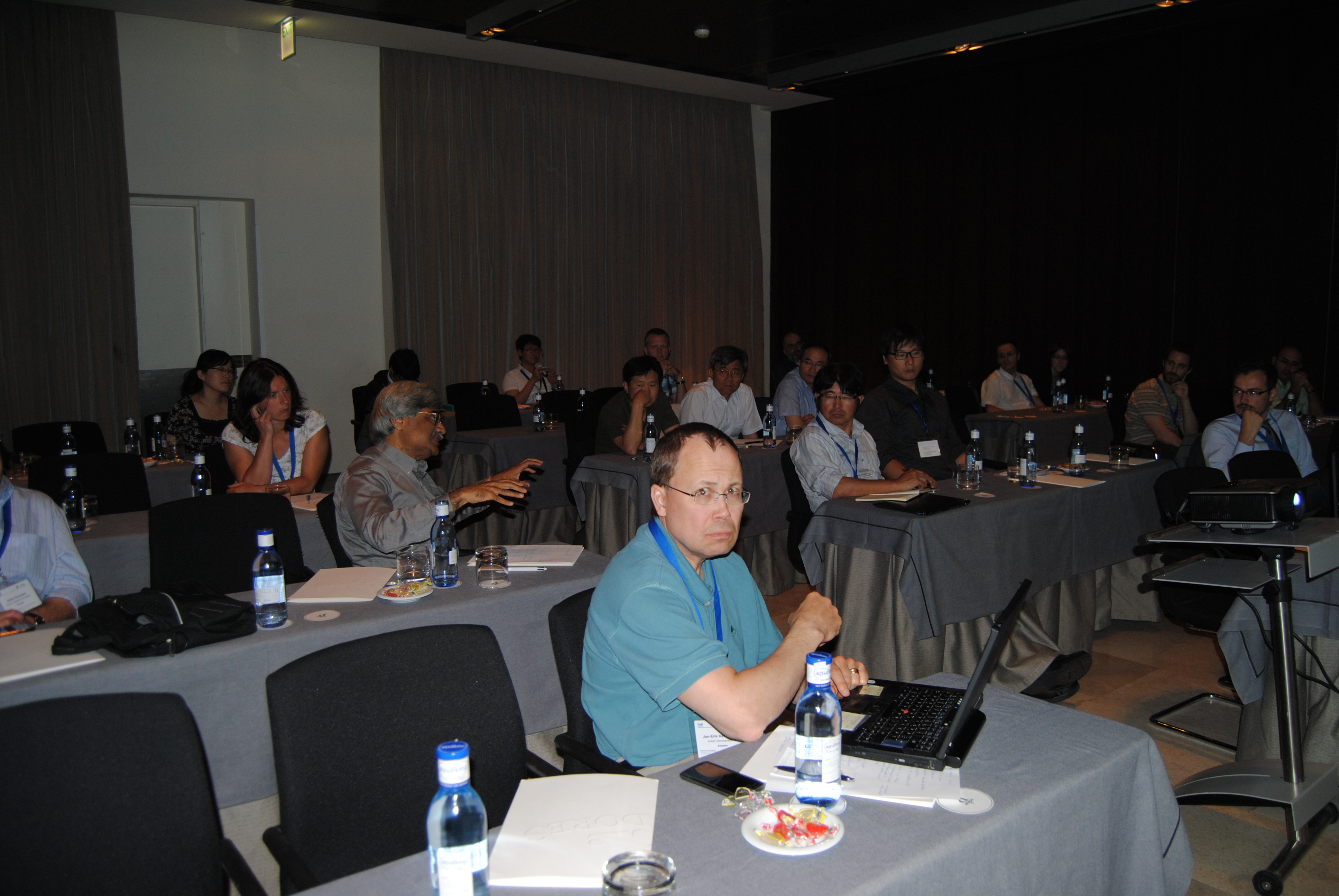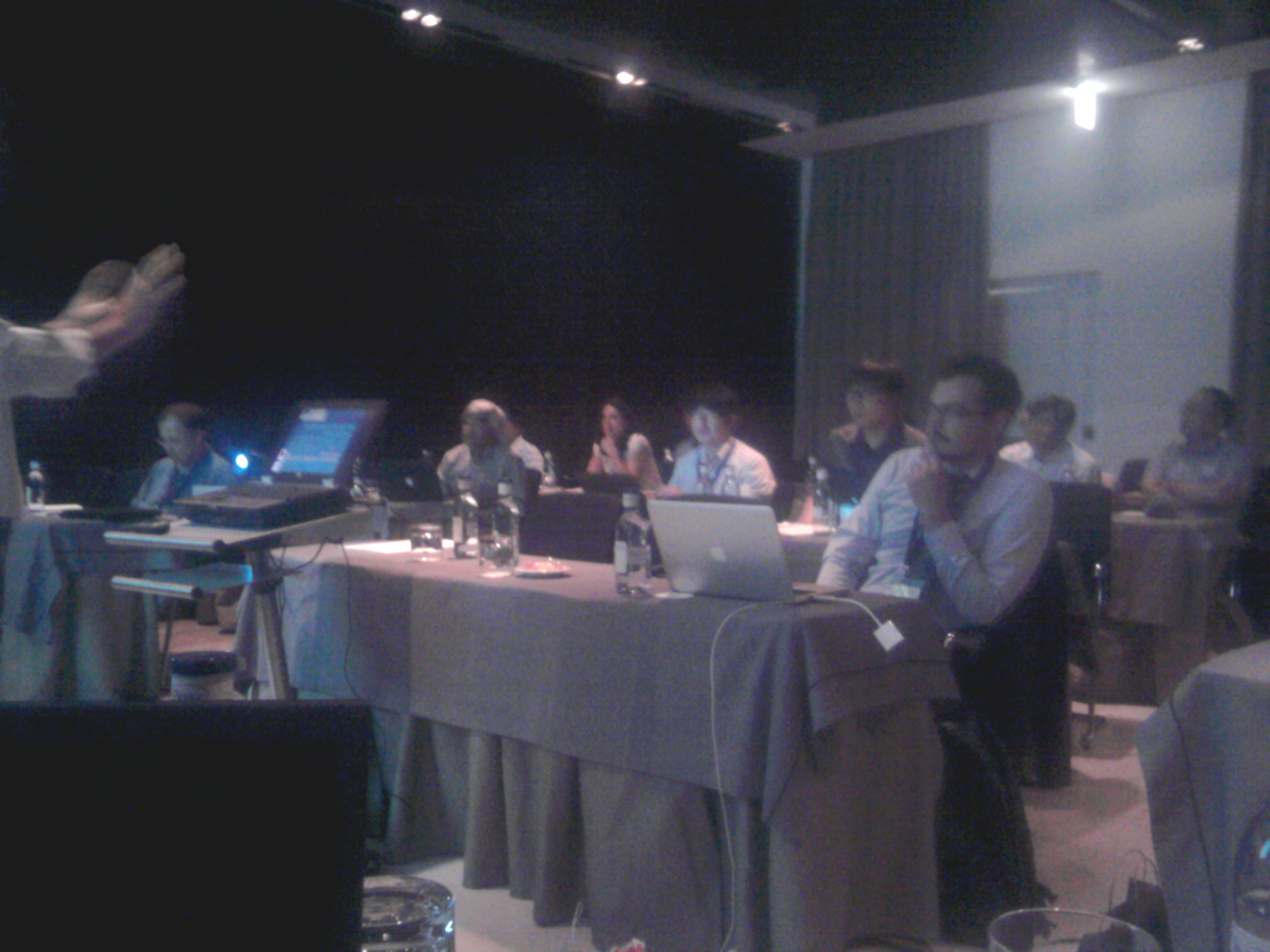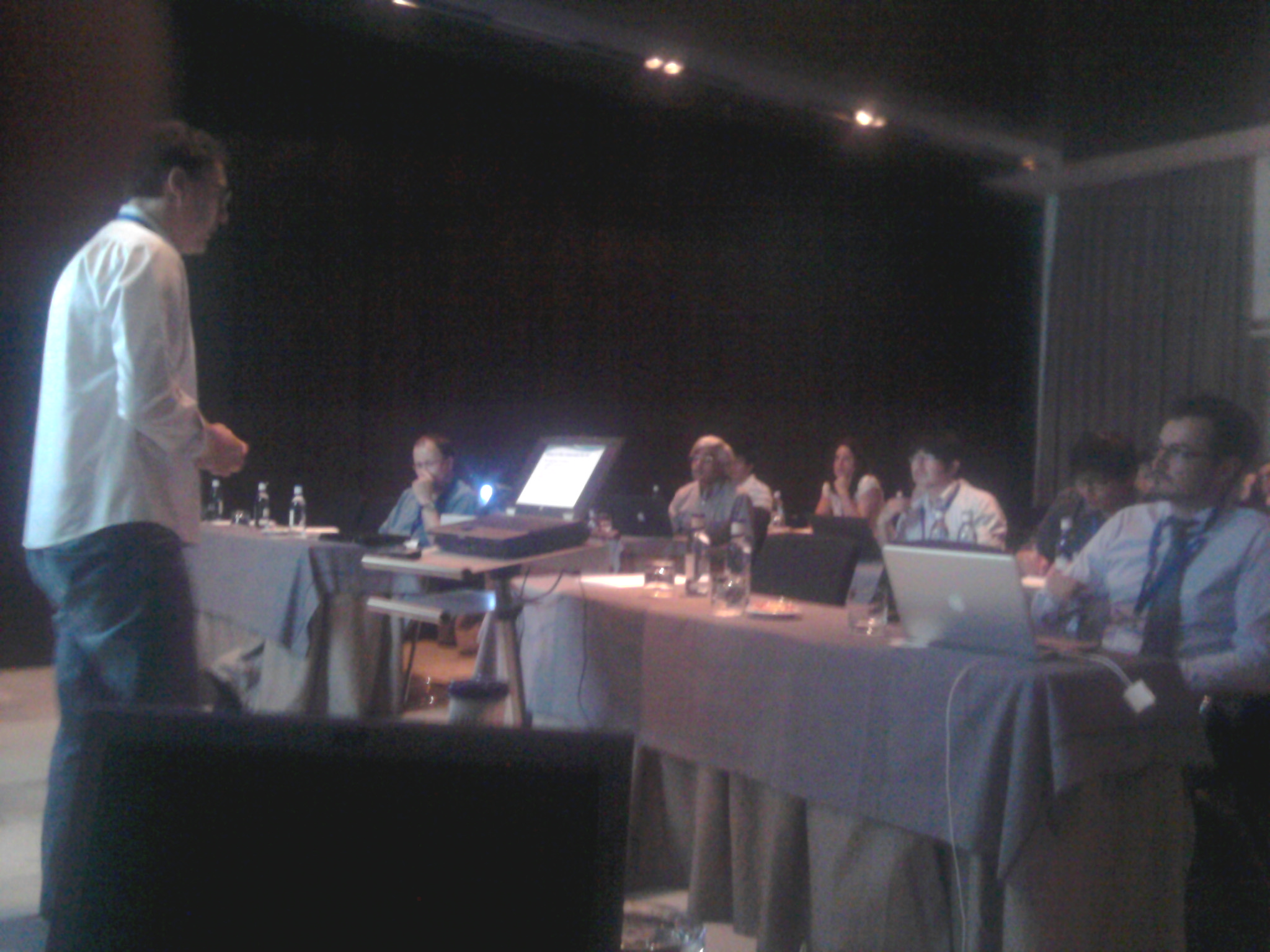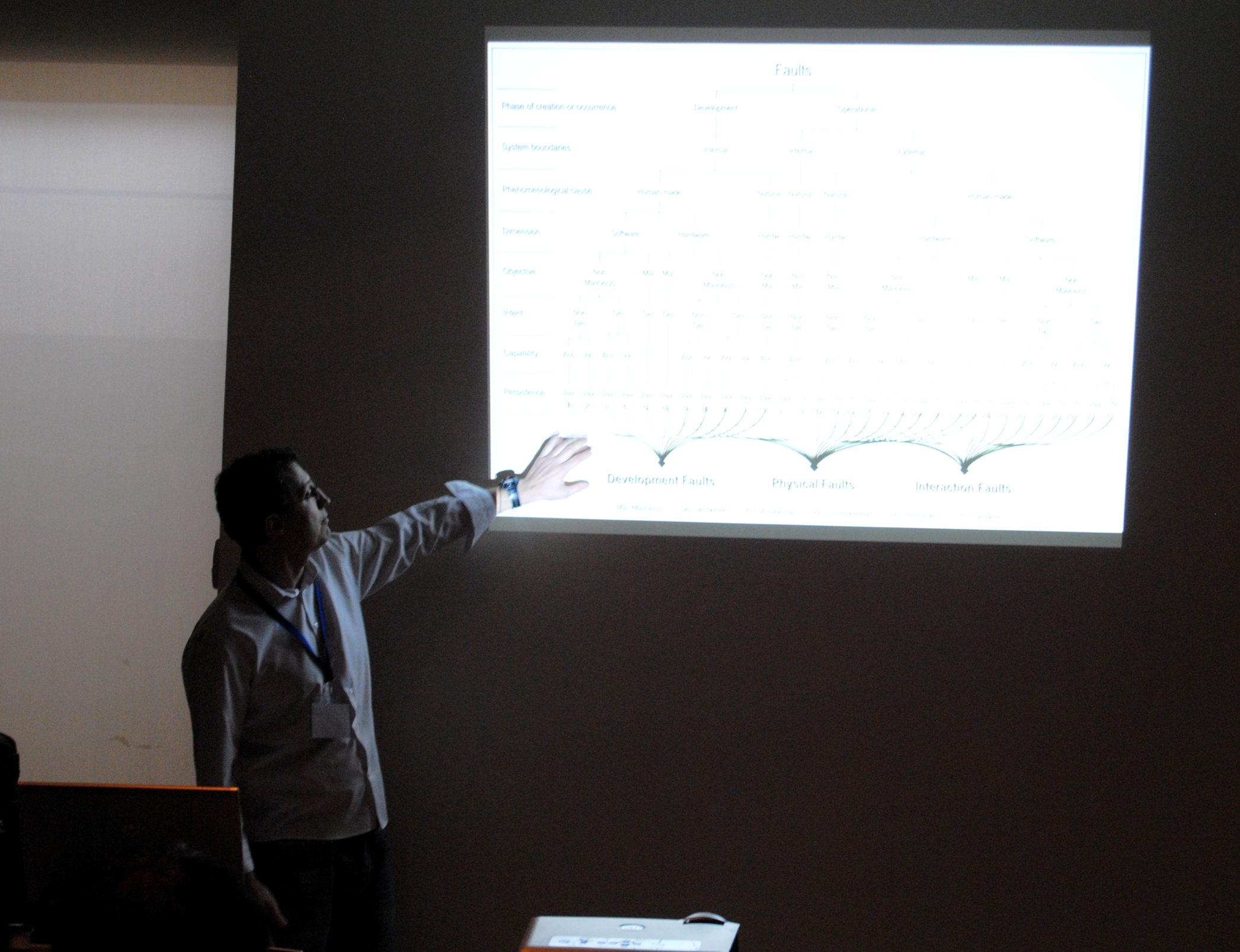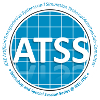Thank you everybody for making possible the Workshop on Human Factors in Intelligent Vehicles, in its 1st edition at IEEE IV’12! We hope to see you again next year.

This workshop is promoted by IEEE ITS Society’s Artificial Transportation Systems and Simulation (ATSS) Technical Activities Sub-Committee.
The workshop will take place in the Hotel Parador de Alcalá de Henares on June the 3rd, 2012.
It is the first edition to be co-placed with the 2012 IEEE Intelligent Vehicles Symposium, to be held in Alcalá de Henares, Spain, June 3-7, 2012.
NEWS:
2012/03/01 The submission deadline has been extended to March 9th 23:59 CET.
Aim and Scope
The Workshop on Human Factors in Intelligent Vehicles (HFIV’12) aims to foster discussion on issues related to the analysis of human factors in the design and evaluation of intelligent vehicles (IV) technologies, in a wide spectrum of applications and in different dimensions.
The HFIV’12 welcomes and encourages contributions reporting on original research, work under development and experiments of different fields related to Human Factors.
It is expected to build upon a proper environment to disseminate knowledge and motivate interactions among the technical and scientific communities, practitioners and students, allowing state-of-the-art concepts and advances to be further developed and enhanced.
IV technologies have experienced a great improvement in the last couple of decades, turning vehicles into more interactive counterparts in transportation and mobility systems. However, the impact of such technologies on traffic awareness for the driver and driver’s behaviour towards improving driving performance and reducing road accidents still demands proper tools and approaches. While the feasibility of incorporating new technology-driven functionality to vehicles has played a central role in the automotive design, not always safety issues related to interaction with the new in-vehicle systems have been taken into consideration. Additionally, other aspects are equally important and need to be analyzed, such as the impact technologies that support specific driving functions play on the overall driving task, as well as their impact on the transportation system overall performance. Besides current industrial achievements that feature today’s vehicles with a number of important driving assistance systems, the perspective of autonomous driving vehicles populating urban environment pose even more challenging issues.Thus, the information and functionality that relies on new ways of communication has to be presented in a non-intrusive way that complies with specific design requirements. A system that guarantees efficiency of use, comfort and user satisfaction can contribute to a more conscious driving behaviour that would directly result from the adoption of IV technologies.
Topics of Interest
Some topics of interest include (but are not limited to) the following:
- Intelligent user interfaces
- Human-machine interaction
- Human-in-the-loop simulation
- Cognitive aspects of driving
- Human behaviour and capability, affecting system’s design and operation
- Modeling and simulation in driver’s behaviour analysis
- Ergonomics of traveler information systems
- Tools and approaches to analyze human factors
- Behavioral elicitation and influence
- Anthropometric layout of vehicular technical systems
- Methodologies to optimize overall system performance
- Mixed Reality
- Cross-Cultural Design
- Augmented Cognition
- User Experience and Usability
- Cognitive Modeling
- Effects of in-vehicle systems on driver performance
- Tools and methodologies for usability assessment
- Input/Output modalities in system ergonomic design
Paper Submission and Publication
Prospective authors are invited to submit contributions reporting on their current research and ideas that motivate discussion during the workshop. Each paper will be analyzed by the International Program Committee according to their relevance and potential contribution. Accepted papers will be included in the workshop proceedings in a digital format and will be made available to the participants of all the workshops at the IV’12. Selected papers will be published in the IEEE Intelligent Transportation Systems Magazine under a special journal issue.
Authors must follow the IEEE Conference format in the preparation of their manuscripts of maximum 6 pages in standard IEEE double column PDF format via email to the workshop organizers for peer-review by the workshop International Program Committee. All accepted papers will imply that at least one of the co-authors attends the workshop to present the work. Authors will be given a certain time to orally present their papers and discussion will be actively motivated among attendees.
Detailed submission instructions can be found on the Workshop Web site at HFIV’12, under the Submissions option.
Manuscript submission
HFIV’12 Workshop
IEEE IV’12
Oganizing Committee
Institute of Ergonomics, Department of Mechanical Engineering, Technische Universität München, Germany
Department of Informatics Engineering, University of Porto, Portugal
International Program Committee
Manuscript preparation
The 1st HFIV Workshop welcomes contributions within the scope and topics of the forum. While preparing your manuscript, please do follow the same formatting guidelines specified by IEEE IV’12 main conference standard IEEE double column PDF of maximum 6 pages .
For the final version of the papers, please use Word or Latex templates and test the pdf file using the Papercept tool to avoid problems caused by wrong paper formats.
Further details on formatting, frequently asked questions and templates are available on the Conference Web Site.
Manuscript submission
Contributions must be electronically submitted in PDF files only, in format via email to the workshop organizers for peer-review by the workshop International Program Committee.
Reviewing process
The reviewing process of contributions is certainly one of the most important aspects of building a strong, attractive and stimulating forum for practitioners and the scientific community. Each manuscript submitted to HFIV’12 shall undergo a peer-reviewing process by at least three members of the Workshop’s International Programme Committee (IPC) to ensure accepted papers will be of great interest and motivate an open and broad discussion among the audience. Contributions will be reviewed according to their relevance to HFIV’12, originality and novel ideas, technical soundness and quality of presentation. Given the nature and aims of the forum, undergoing projects bringing into discussion state-of-the-art and cutting-edge ideas and novel trends are highly encouraged.
Authors of accepted papers must follow and carefully consider reviewers’ comments, guidelines, and suggestions during the preparation of their camera-ready version for inclusion in the workshop proceedings in a digital format.
Publication
Accepted papers will be included in the workshop proceedings in a digital format and will be made available to the participants of all the workshops at the IV’12.
Selected papers will be published in the IEEE Intelligent Transportation Systems Magazine under a special journal issue.
At least one co-author of each paper must confirm registration at the workshop as well as the oral presentation during the event to ensure the paper will be considered for publication.
Authors will be given a certain time to orally present their papers and discussion will be actively motivated among attendees.
Camera-ready manuscripts must be sent to the workshop chair due on April 15th, 2012.
Conference Program
You can access the IEEE IV’12 conference program through the Conference Web Site.
Key Note Speakers
Short bio

Prof. Philippe Palanque is Professor in Computer Science at the University Toulouse 3 – Paul Sabatier and is head of the Interactive Critical Systems group at the Institut de Recherche en Informatique de Toulouse (IRIT) in France. He has worked on research projects to improve interactive Ground Segment Systems at the Centre National d'Études Spatiales (CNES) for more than10 years and is also involved in the development of software architectures and user interface modeling for interactive cockpits in large civil aircraft (funded by Airbus). The main driver of his research over the last 20 years has been to place the human at the center of the development processes of computing devices. His current research deals with formal description techniques to support the design and construction of resilient interactive systems taking into account in an even way, usability, safety and dependability. As for conferences he was the general chair of IFIP TC 13 INTERACT 2011, is paper chair of the ACM EICS 2012 symposium and will chair ACM CHI conference in 2014.
Prof. Philippe Palanque will present the topic with the title: "Automation in command and control systems: what should be remembered and what should be forgotten when designing Safe, Usable, Reliable and Enjoyable intelligent vehicles."
Summary
Bringing more "Intelligence" to computing systems has been the main design driver of the last generations of computing devices. Such intelligence is usually associated with the notion of autonomy and cooperation. In Air Traffic Management the common example to illustrate this concept is the one of the horse being able to bring his horsemen back to his house in an autonomous way without any guidance. While giving a grasp at the objectives and highlighting the way for research, such example does not help much in identifying the various steps that have to be followed in order to reach these objectives. When it comes to command and control computing systems (embedded or not) many design, implementation, validation and legal issues are raised. Analysis of early developments in cruise control systems in cars (Degani et al. 1999) have demonstrated the difficulty for designers and engineers to manage the complexity of (partly-) autonomous systems resulting in difficult to use-and-understand and potentially unsafe systems. Designing interactive computing systems in such a way that as much functions as possible are automated has been the driving direction of research and engineering both in aviation and in computer science for many years. In the 90’s many studies (e.g. (Sarter & Woods 1995) and (Palmer 1995) related to the notion of mode confusion) have demonstrated that fully automated systems are out of the grasp of current technologies and that additionally migrating functions (Boy 1998) from the operator to the system might have disastrous impact on safety and usability and operationality of systems. Allocating functions to an operator or automating them, raises issues that require a complete understanding of both operations to be carried out by the operator and the behavior of the interactive system. Automation bring also the issue of authority and responsibility sharing whether this being between the device and the operator or amongst various autonomous devices (Legras et al. 2008). In aviation, the 2002 Überlingen mid-air collision brought such responsibility issue to a larger audience exhibiting the disastrous impact of wrong resolution of conflict between an autonomous collision avoidance system and an air traffic controller (Johnson 2002). This invited presentation will highlight knowledge that has been gained in the area of air traffic management and aviation around the notion of (partly-) autonomous systems and automation. This presentation will draw parallels with current trends in ground vehicle systems design highlighting commonalities and discrepancies. One of the main discrepancies being around the user experience factor which is very prominent an exhibited for car drivers while being of very low importance (and most of the time even hindered) in civil aviation. We will also highlight the issue of "intelligence" degradation and how such degradation could have on usability, safety and dependability of in-car embedded systems.
Short bio
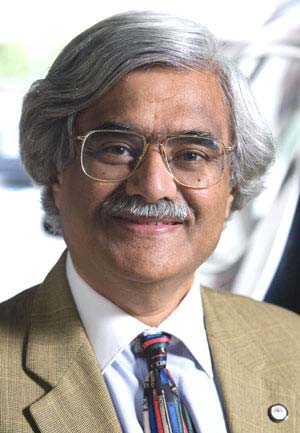
Prof. Mohan Manubhai Trivedi is a professor of Electrical and Computer Engineering and founding director of the Computer Vision and Robotics Research Laboratory at the University of California at San Diego. He has also established LISA: Laboratory for Intelligent and Safe Automobiles at UCSD. Currently, Trivedi and his team are pursuing research in distributed video arrays, active vision, human body modeling and activity analysis, intelligent driver assistance and active safety systems for automobiles. He is a co‐author of a number of papers winning “Best Papers” awards. Two of his students were awarded Best Dissertation Awards by the IEEE ITS Society (Dr. Shinko Cheng 2008 and Dr. Brendan Morris 2010). Most recently Dr. Anup Doshi’s dissertation was selected as the UCSD’s top dissertation entry and was judged among the five finalists by the Western Association of Graduate Schools (WAGS). Trivedi’s team has played a key role in several major research collaborative initiatives. These include an autonomous robotic team for Shinkansen track maintenance, autonomous vision‐based robots for nuclear environments, human‐centered vehicle collision avoidance systems, vision based passenger protection system for “smart airbags and several vision systems for transportation and homeland security applications. He serves regularly as a consultant to industry and government agencies in the USA and abroad. Trivedi has received the Distinguished Alumnus Award from the Utah State University, Pioneer Award (Technical Activities) and Meritorious Service Award from the IEEE Computer Society. Trivedi has given over 65 Keynote/Plenary talks at major conferences. Trivedi is a Fellow of the IEEE (“for contributions to Intelligent Transportation Systems field”), Fellow of International Association of Pattern Recognition IAPR (“for contributions to vision systems for situational awareness and human‐centered vehicle safety”), and Fellow of the Society for Optical Engineering, SPIE (“for contributions to the field of optical engineering”).
Prof. Mohan Trivedi will present the topic with the title: "Holistic Observations and Learning for Active Safety."
Summary
Designing fully autonomous robotic vehicles which can drive on regular roads does not require models of drivers and how they interact with vehicles. In contrast, design of advanced intelligent driver assistance systems requires human behavior understanding, human‐vehicle interaction modeling and human intent prediction. We will present an overview of a “human‐centered” framework for a distributed intelligent system with the driver, vehicle and environment as three key components. We will emphasize the need and implications of utilizing a holistic approach where driving in naturalistic context is observed over long periods to learn driving behavior and to predict driver intentions and interactivity patterns. The presentation will include discussion of selected ongoing studies and will conclude with some pointers to important outstanding research challenges.
Related Publications
[complete list on related publications ] Anup Doshi, Brendan Morris, and Mohan Trivedi, "On Road Prediction of Driver's Intent with Multimodal Sensory Cues", IEEE Pervasive Computing, Special Issue on Automotive Pervasive Computing, 2011. Cuong Tran and Mohan M. Trivedi, "Vision for Driver Assistance: Looking at People in a Vehicle”, Guide to Visual Analysis of Humans: Looking at People, Springer. Ed T.B. Moeslund, L. Sigal, V. Krueger, A. Hilton, 2011. Sayanan Sivaraman and Mohan M. Trivedi, “Active Learning for On‐road Vehicle Detection: A Comparative Study," Machine Vision and Applications, 2012. Sayanan Sivaraman, Brendan Morris, and Mohan M. Trivedi, "Learning Multi‐Lane Trajectories using Vehicle Based Vision," IEEE Int Conf Computer Vision [ICCV], Workshop on Computer Vision for Vehicle Technology [ICCV CVVT], Barcelona, Spain, Nov. 2011.
HFIV’12 Workshop Program
| 14.30-15.00 | Invited Talk "Automation in command and control systems: what should be remembered and what should be forgotten when designing Safe, Usable, Reliable and Enjoyable intelligent vehicles.", Prof. Philippe Palanque, University Paul Sabatier (Toulouse 3). |
| 15.00-15.30 | "An Adaptive Mechanism to Infer Vehicular Occupancy with Event Processing"; Fernando Terroso-Sáenz, Mercedes Valdés-Vela and Antonio F. Skarmeta-Gómez |
| 15.30-16.00 | "Traffic Light Assistant – Driven in a Simulator"; Michael Krause and Klaus Bengler |
| 16.00-16.30 | Coffee Break |
| 16.30-17.00 | Invited Talk "Holistic Observations and Learning for Active Safety.", Prof. Mohan Trivedi, University of California at San Diego. |
| 17.00-17.30 | "PieDrive – a New Driver-Vehicle Interaction Concept for Maneuver-Based Driving"; B. Franz, M. Kauer, R. Bruder, and S. Geyer |
| 17.30-18.00 | Open Discussion and workshop closing |
Inquiries and further information
Please send your manuscripts and requests by e-mail to: HFIV12 @ dcc . fc . up . pt (no spaces).
Contact details
If necessary, the Organizing Committee’s contact details are:
Institute of Ergonomics
Faculty of Mechanical Engineering
Technische Universität München
Boltzmannstraße 15
D-85747 Garching bei München, Germany
Phone: + 49 89 289-15413
Fax : + 49 89 289-15389
Email: olaverri @ lfe . mw . tum . de (no spaces)
LIACC/DEI/FEUP
Faculty of Engineering, University of Porto
Rua Dr Roberto Frias, S/N
4200-465 Porto, Portugal
Phone: +351 22 508 1566
Fax: +351 22 557 4103
Email: rossetti @ fe . up . pt (no spaces)





